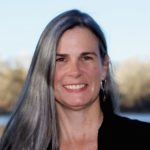
Erin Smith is a clinical herbalist and ethnobotanist and has been working with medicinal plants for 30 years.
This past summer NSF offered a 6-week online Sustainability Bootcamp for professionals in the food, supplements and beverage industries who aim to lead sustainability programs for their company and communities. They are offering a new session from September 26 – November 7, 2019 and are offering 15% off with Code ABC15 (active Until September 24).
I spoke with Erin Smith, Director of Sustainability for Wishgarden Herbs and SHP Advisory Group Member, to find out more about what the course offers and how it will help her in her work. I’ve summarized the key points from our conversation.
Overall:
The sustainability bootcamp was a really great concise introduction to sustainability across industries that was useful for those new to sustainability and to those like Erin who have been working in this field for many years. NSF provided useful hands on tools for capturing and clearly presenting complex data on a variety of topics that Erin has been able to immediately put to use. The course also provided a great opportunity to connect with others working on sustainability issues in a variety of industries, to learn from their experiences and how they are addressing different challenges.
Content
-
Business case for Sustainability
The bootcamp provided guidance on information and research for building your case for why it pays a company to pay attention to sustainability.
-
What is material to the company?
A materiality assessment looks at what is most important to a business based on stakeholder priorities and key sustainability impacts. The assessment asks what you currently do or would like to do as a company and serves as a filter to determine which areas are most important. NSF provides tools to complete your own assessment and graph it out – what is material to your employees, to your sustainability goals, to whatever things you are doing as a company. And then you see what lands in the top quadrant and that is material or most important for your business. The materiality assessment helps guide a company to get very specific about where to begin addressing those topics that are most important.
-
Benchmarking
Benchmarking is a method of evaluating your company’s current performance against the performance of relevant industries, competitors, and/or standards and certifications. Wishgarden has a longterm goal to be a B Corps (see this HerbalEGram piece for an overview of Natural Products companies becoming B Corps certified) and so Erin uses the B Corps self-assessment tool to benchmark where they are, what they are doing well and what they haven’t yet thought of. NSF provided additional tools for benchmarking and for researching other leaders in the industry to see what they are doing. The goal of benchmarking is to see what you are doing well, what areas need work, and what you are doing that others aren’t doing and so helping you find your strengths.
-
Mapping Your Impact
An impact assessment provides the knowledge to measure and address impacts in one or more pillars of sustainability. It provides an initial glance at potential impacts and alternatives, enabling informed, data-driven decisions. NSF provides a number of tools to support mapping your own impact, including input and output models, life cycle assessments, and more. They also provide guidance on how to identify which of your key stakeholders are needed to address your identified impacts and make progress toward sustainability.
-
Setting Goals
Setting goals that are practical and reachable. The course helped with stating these goals in simple terms that are challenging yet also do-able. The exercises leading up to this week led participants through a process so that this goal setting was easier to do, helping participants see what they are already doing well and where they can best focus for improvement.
-
Different Certifications and Reporting
An overview of the certifications available, explaining why companies pursue some of these and why not others; where certifications are beneficial and where they aren’t. This section also included guidance on how to document that you are making progress toward achieving your goals. For companies feeling overwhelmed with the number of certifications, this helped by providing a road map of what is available and how and where to begin.
Structure
Each class was presented via video conferencing. The class began with checking in on the homework from the previous session. NSF presented a new tool pertaining to the topic of the session. After some discussion of the tool, there would be one or two case studies from those in the industry discussing how they addressed the particular topic, say benchmarking.
Some of the case studies included:
- A detailed case study of Mega-Food’s life cycle analysis comparing using amber glass bottles versus switching to plastic.
- The head of sustainability at Justin’s presented on how she made a business case for sustainability to the new owners of Justin’s when they were purchased by Hormel’s.
- Overview of certifications and their role in sustainability initiatives at Traditional Medicinals.
Sustainability Bootcamp Highlights and Next Steps
The highlights for Erin were the case studies, the tools, and the chance to learn from other participants. The tools are and will be helpful in visually documenting the work she has been doing in sustainability at WishGarden. These documents help make it clear where the company’s gaps and the strengths are, what their sustainability goals are and the steps they are taking to achieve those goals. This in turn has helped streamline her meetings with heads of other departments when discussing issues around sustainability.


Comments